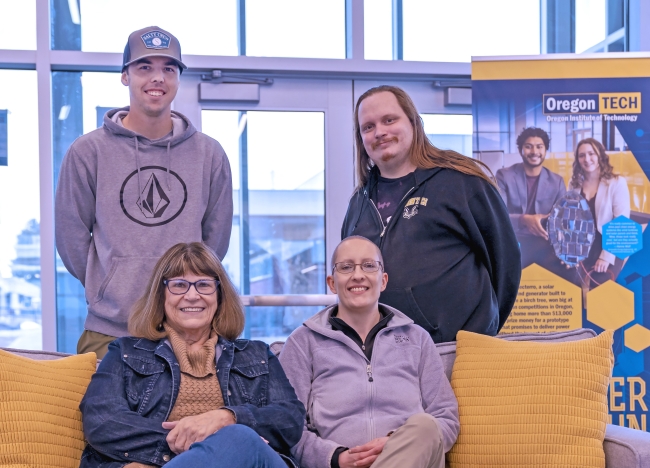You have /5 articles left.
Sign up for a free account or log in.

Oregon Institute of Technology seniors Steven Barton, Duane Munjar II, Donna Markus and Erin Miller wrote a grant proposal, earning $11,000 for mobile hotspot devices.
Oregon Institute of Technology
Four seniors at the Oregon Institute of Technology earned grant money to launch a mobile hotspot checkout pilot program to support students’ access to high-speed internet access.
The pilot program will launch in fall 2023, equipping the campus community with 40 mobile hotspots that campus constituents can use for coursework and research to promote student success.
The inspiration: Professional writing professor Amber Lancaster taught Project Management for Writers at Oregon Tech and assigned students to a group project addressing a “wicked problem” on campus.
“A wicked problem is, essentially, I don’t want to say a problem that can’t be fixed,” Oregon Tech senior Erin Miller explains. “But the general gist is a symptom of a much larger social or economic issue that really can only be addressed in bits and pieces.”
Miller and three other seniors—Steven Barton, Donna Markus and Duane Munjar II—created a group to tackle connectivity issues at Oregon Tech.
“We are working in tech, but we have so many issues with technology on campus,” Miller says. “And one of the primary problems that we had discovered was having reliable internet access.”
Surveys: Internet Access a Concern Nationwide
Oregon Tech’s location in rural Klamath Falls, Ore., presents unique challenges in providing reliable internet, but college students’ connectivity is a nationwide problem.
The 2022 Student Well-being Institutional Support Survey from Butler University’s Institute for Well-Being found around 17 percent of survey respondents disagreed that their institution provides access to reliable internet.
A 2021 report from the Institute for Higher Education Policy found Black and Latino students had inequitable access in paying for fast and stable internet, compared to their white peers.
Residence halls have unreliable internet service, Miller says, but students living off campus also struggle to get online. Miller, for one, opted to not pay for internet at her off-campus housing to save money, but she found the university’s internet connection did not provide her with consistent service either.
For students like Miller who lack access at home, it can be difficult to complete coursework because a significant portion of it takes place online.
“With the shift from more traditionally face-to-face classes to hybrid classes to fully online classes, especially after COVID, we could see there’s a huge digital divide,” Lancaster says.
Launching the program: The students identified mobile hotspots as their solution because they are cheap and reliable and could benefit multiple students throughout the term.
After they turned in their project, Lancaster encouraged the students to submit an academic affairs proposal to the Oregon Tech Foundation for a grant to fund the initiative.
“It’s not a requirement that they implement their project … but I do encourage and I have always encouraged students to take it to the next step, because you did all this work for it, you might as well try and see,” Lancaster says.
The student team connected the idea to Oregon Tech’s Academic Master Plan, identifying how it could attract and retain diverse students, increase high-impact practices for retention and connect to online and hybrid course delivery.
Staying Connected
The mobile hotspot checkout isn’t unique to Oregon Tech; other institutions in the state, like Western Oregon University and Central Oregon Community College, offer similar features. The primary challenge with a hotspot offering is funding.
“There’s been a lot of funding cuts in higher education,” Miller says. “In Oregon, in particular, we just discovered that the new governor has not provided as much public funding towards universities as we were expecting.”
The University of Oregon, for example, charges students $5 per day to use their mobile hotspots. The service had been free but ended in September 2021. WOU’s library used emergency federal funding for its hotspot lending program but, as money ran out, the program was “significantly curtailed,” according to the website.
“Lo and behold, it amazingly got funded,” Miller says, and the group was awarded $11,700.
In their proposal, the student group requested funds to run 15 hotspots and service lines, but they will be able to purchase closer to 40, thanks to government rates.
How it works: The pilot program will run during the 2023–24 academic year. Students in the professional writing program will be able to check out devices at a central location on campus, similar to a laptop checkout at the library or camera checkout in a media department.
The hotspots will be available to students on a first-come, first-served basis for anything from turning in coursework to completing fieldwork in a remote area.
In the meantime, the team is identifying a service provider, purchasing the devices and setting up a checkout system.
“Dealing with quotes and purchasing as a government entity can be tricky, but we’re managing! It’s been pretty smooth so far, realistically,” Lancaster says.
If the program proves useful and helpful to students, the hope is to further the program and purchase additional hotspots for other Oregon Tech programs and campuses.
Seeking stories from campus leaders, faculty members and staff for our Student Success focus. Share here.




